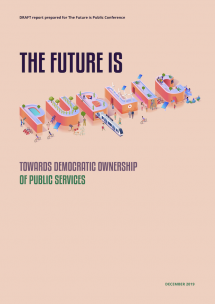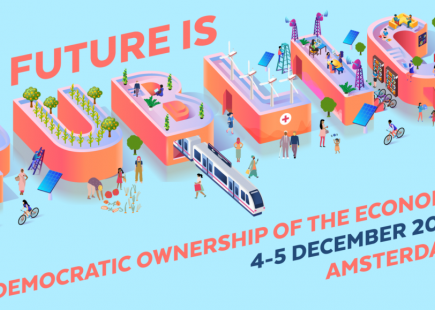The Future is Public Democratic Ownership of Public Services
The Future is Public report is about more than just numbers. A growing international movement is building democratic public services for the social, ecological and economic challenges of our time.

Descargas

In the face of climate catastrophe, mounting inequalities and growing democratic unrest, public services are more important than ever. As privatisations fail across the world, people are building better, more democratic and inclusive public services.
Resistance to privatisation has turned into a powerful force for change: (Re)municipalisation. (Re)municipalisation refers to reclaiming public ownership and creating new public services. The Transnational Institute and partner organisations have identified more than 1,400 successful (re)municipalisation cases, involving over 2,400 cities in 58 countries.
But The Future is Public report is about more than just numbers. A growing international movement is building democratic public services for the social, ecological and economic challenges of our time. (Re)municipalisation is redefining public ownership in the 21st century, offering a new route towards community-led, climate conscious and gender-sensitive public services.
Some of the most progressive municipalities, such as the Philippine cities Binalonan, Caloocan and Lanuza, are recentering their public services to prioritise the needs of the most marginalised people in society, including women, people with disabilities, and low-income families, among others. While others, such as Paris, Terrassa and Wolfhagen, dare to share decision-making powers and open up ownership models to representatives of users, workers, civil society and research institutions. Together, they are shaping a template for how to expand democratic public ownership to all levels of society.
The data and stories also illustrate the diversity of remunicipalisation efforts, taking us to new countries and new sectors that present their own specific challenges, such as waste management in some countries in Africa, the many new public pharmacies in Chile, and the call of the UK Labour Party to provide public internet access as a human right.
Civil society organisations, trade unions and local authorities can push in concert for democratic public ownership on all levels and call for universal public services so that all residents can lead dignified and prosperous lives. This way, we put the “public” back into public services, while actually changing the design of our economies.
As racism, fascism and xenophobia is on the rise, we must offer solidarity and concrete solutions–decent jobs, public services for all, and resilient local economies. Our public future lies in the hands of communities – not corporations.
This report is presented as a draft at the Future is Public conference (December 2019) to invite feedback and strengthen our analysis. Your views are important and welcome. This report and 15 working papers together form the conference resources. The Transnational Institute and co-publishers plan to publish the improved report and final papers as a book in 2020.
To access the conference resources: https://futureispublic.org/